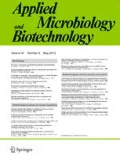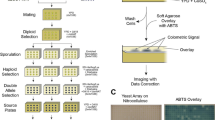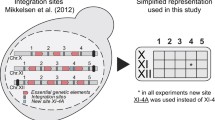Abstract
Experimental research in molecular biology frequently relies on the promotion or suppression of gene expression, an important tool in the study of its functions. Although yeast is among the most studied model systems with the ease of maintenance and manipulation, current experimental methods are mostly limited to gene deletion, suppression or overexpression of genes. Therefore, the ability to reduce protein expressions and then observing the effects would promote a better understanding of the exact functions and their interactions. Reducing protein expression is mainly limited by the difficulties associated with controlling the reduction level, and in some cases, the initial endogenous abundance is too low. For the under-expression to be useful as an experimental tool, repeatability and stability of reduced expression is important. We found that cis-elements in programmed −1 ribosomal frameshifting (−1RFS) of beet western yellow virus (BWYV) could be utilized to reduced protein expression in Saccharomyces cerevisiae. The two main advantages of using −1RFS are adjustable reduction rates and ease of use. To demonstrate the utility of this under-expression system, examples of reduced protein abundance were shown using yeast mating pathway components. The abundance of MAP kinase Fus3 was reduced to approximately 28–75 % of the wild-type value. Other MAP kinase mating pathway components, including Ste5, Ste11, and Ste7, were also under-expressed to verify that the −1RFS system works with different proteins. Furthermore, reduced Fus3 abundance altered the overall signal transduction outcome of the mating pathway, demonstrating the potential for further studies of signal transduction adjustment via under-expression.




Similar content being viewed by others
References
Aigner A (2007) Applications of RNA interference: current state and prospects for siRNA-based strategies in vivo. Appl Microbiol Biotechnol 76(1):9–21. doi:10.1007/s00253-007-0984-y
Alberts B, Johnson A, Lewis J, Raff M, Roberts K, Walter P (2002) Studying gene expression and function. Molecular biology of the cell, 4th edn. Garland Science, New York
Blake WJ, KAErn M, Cantor CR, Collins JJ (2003) Noise in eukaryotic gene expression. Nature 422(6932):633–637. doi:10.1038/nature01546
Bodai L, Marsh JL (2012) A novel target for Huntington’s disease: ERK at the crossroads of signaling. The ERK signaling pathway is implicated in Huntington’s disease and its upregulation ameliorates pathology. BioEssays 34(2):142–148
Boone C, Bussey H, Andrews BJ (2007) Exploring genetic interactions and networks with yeast. Nat Rev Genet 8(6):437–449. doi:10.1038/nrg2085
Burchett SA, Scott A, Errede B, Dohlman HG (2001) Identification of novel pheromone-response regulators through systematic overexpression of 120 protein kinases in yeast. J Biol Chem 276(28):26472–26478. doi:10.1074/jbc.M103436200
Choi KY, Kranz JE, Mahanty SK, Park KS, Elion EA (1999) Characterization of Fus3 localization: active Fus3 localizes in complexes of varying size and specific activity. Mol Biol Cell 10(5):1553–1568
Chong YT, Koh JL, Friesen H, Duffy K, Cox MJ, Moses A, Moffat J, Boone C, Andrews BJ (2015) Yeast proteome dynamics from single cell imaging and automated analysis. Cell 161(6):1413–1424. doi:10.1016/j.cell.2015.04.051
Ding J, Bierma J, Smith MR, Poliner E, Wolfe C, Hadduck AN, Zara S, Jirikovic M, van Zee K, Penner MH, Patton-Vogt J, Bakalinsky AT (2013) Acetic acid inhibits nutrient uptake in Saccharomyces cerevisiae: auxotrophy confounds the use of yeast deletion libraries for strain improvement. Appl Microbiol Biotechnol 97(16):7405–7416. doi:10.1007/s00253-013-5071-y
Dohmen RJ, Stappen R, McGrath JP, Forrova H, Kolarov J, Goffeau A, Varshavsky A (1995) An essential yeast gene encoding a homolog of ubiquitin-activating enzyme. J Biol Chem 270(30):18099–18109
Eggert US, Field CM, Mitchison TJ (2006) Small molecules in an RNAi world. Mol BioSyst 2(2):93–96. doi:10.1039/b515335b
Elion EA, Grisafi PL, Fink GR (1990) FUS3 encodes a cdc2+/CDC28-related kinase required for the transition from mitosis into conjugation. Cell 60(4):649–664. doi:10.1016/0092-8674(90)90668-5
Elion EA, Brill JA, Fink GR (1991) FUS3 represses CLN1 and CLN2 and in concert with KSS1 promotes signal transduction. Proc Natl Acad Sci 88(21):9392–9396
Farabaugh PJ (1996) Programmed translational frameshifting. Annu Rev Genet 30:507–528. doi:10.1146/annurev.genet.30.1.507
Farabaugh PJ (2000) Translational frameshifting: implications for the mechanism of translational frame maintenance. Prog Nucleic Acid Res Mol Biol 64:131–170. doi:10.1016/S0079-6603(00)64004-7
Hilioti Z, Sabbagh W Jr, Paliwal S, Bergmann A, Goncalves MD, Bardwell L, Levchenko A (2008) Oscillatory phosphorylation of yeast Fus3 MAP kinase controls periodic gene expression and morphogenesis. Curr Biol 18(21):1700–1706. doi:10.1016/j.cub.2008.09.027
Hoffman GA, Garrison TR, Dohlman HG (2002) Analysis of RGS proteins in Saccharomyces cerevisiae. Methods Enzymol 344:617–631. doi:10.1016/S0076-6879(02)44744-1
Huh WK, Falvo JV, Gerke LC, Carroll AS, Howson RW, Weissman JS, O’Shea EK (2003) Global analysis of protein localization in budding yeast. Nature 425(6959):686–691. doi:10.1038/nature02026
Hur JY, Kang GY, Choi MY, Jung JW, Kim KP, Park SH (2008) Quantitative profiling of dual phosphorylation of Fus3 MAP kinase in Saccharomyces cerevisiae. Mol Cells 26(1):41–47
Hur JY, Park MC, Suh KY, Park SH (2011) Synchronization of cell cycle of Saccharomyces cerevisiae by using a cell chip platform. Mol Cells 32(5):483–488. doi:10.1007/s10059-011-0174-8
Moon J, Park SH (2014) Reassembly of JIP1 scaffold complex in JNK MAP kinase pathway using heterologous protein interactions. PLoS ONE 9(5):e96797. doi:10.1371/journal.pone.0096797
Kamisaka Y, Kimura K, Uemura H, Yamaoka M (2013) Overexpression of the active diacylglycerol acyltransferase variant transforms Saccharomyces cerevisiae into an oleaginous yeast. Appl Microbiol Biotechnol 97(16):7345–7355. doi:10.1007/s00253-013-4915-9
Kim EK, Choi EJ (2010) Pathological roles of MAPK signaling pathways in human diseases. Biochim Biophys Acta 1802(4):396–405. doi:10.1016/j.bbadis.2009.12.009
Kim YG, Su L, Maas S, O’Neill A, Rich A (1999) Specific mutations in a viral RNA pseudoknot drastically change ribosomal frameshifting efficiency. Proc Natl Acad Sci 96(25):14234–14239
Kim YG, Maas S, Wang SC, Rich A (2000) Mutational study reveals that tertiary interactions are conserved in ribosomal frameshifting pseudoknots of two luteoviruses. RNA 6(8):1157–1165
Kranz JE, Satterberg B, Elion EA (1994) The MAP kinase Fus3 associates with and phosphorylates the upstream signaling component Ste5. Genes Dev 8(3):313–327
Longtine MS, McKenzie A 3rd, Demarini DJ, Shah NG, Wach A, Brachat A, Philippsen P, Pringle JR (1998) Additional modules for versatile and economical PCR-based gene deletion and modification in Saccharomyces cerevisiae. Yeast 14(10):953–961. doi:10.1002/(sici)1097-0061(199807)14:10<953::aid-yea293>3.0.co;2-u
Merlini L, Dudin O, Martin SG (2013) Mate and fuse: how yeast cells do it. Open Biol 3(3):130008. doi:10.1098/rsob.130008
Murphy LO, Blenis J (2006) MAPK signal specificity: the right place at the right time. Trends Biochem Sci 31(5):268–275. doi:10.1016/j.tibs.2006.03.009
Nakayashiki H, Nguyen QB (2008) RNA interference: roles in fungal biology. Curr Opin Microbiol 11(6):494–502. doi:10.1016/j.mib.2008.10.001
Ofiteru AM, Ruta LL, Rotaru C, Dumitru I, Ene CD, Neagoe A, Farcasanu IC (2012) Overexpression of the PHO84 gene causes heavy metal accumulation and induces Ire1p-dependent unfolded protein response in Saccharomyces cerevisiae cells. Appl Microbiol Biotechnol 94(2):425–435. doi:10.1007/s00253-011-3784-3
Ramanathan C, Xu H, Khan SK, Shen Y, Gitis PJ, Welsh DK, Hogenesch JB, Liu AC (2014) Cell type-specific functions of period genes revealed by novel adipocyte and hepatocyte circadian clock models. PLoS Genet 10(4):e1004244. doi:10.1371/journal.pgen.1004244
Ryu J, Park SH (2015) Simple synthetic protein scaffolds can create adjustable artificial MAPK circuits in yeast and mammalian cells. Sci Signal 8(383):ra66. doi:10.1126/scisignal.aab3397
Schwartz MA, Madhani HD (2004) Principles of MAP kinase signaling specificity in Saccharomyces cerevisiae. Annu Rev Genet 38:725–748. doi:10.1146/annurev.genet.39.073003.112634
Shim E, Park SH (2014) Identification of a novel Ser/Thr protein phosphatase Ppq1 as a negative regulator of mating MAP kinase pathway in Saccharomyces cerevisia. Biochem Biophys Res Commun 443(1):252–258. doi:10.1016/j.bbrc.2013.11.110
Spencer SL, Gaudet S, Albeck JG, Burke JM, Sorger PK (2009) Non-genetic origins of cell-to-cell variability in TRAIL-induced apoptosis. Nature 459(7245):428–432. doi:10.1038/nature08012
Tong AH, Evangelista M, Parsons AB, Xu H, Bader GD, Page N, Robinson M, Raghibizadeh S, Hogue CW, Bussey H, Andrews B, Tyers M, Boone C (2001) Systematic genetic analysis with ordered arrays of yeast deletion mutants. Science 294(5550):2364–2368. doi:10.1126/science.1065810
Yang L, Zhou J, Ma Q, Wang C, Chen K, Meng W, Yu Y, Zhou Z, Sun X (2013) Knockdown of PPARδ gene promotes the growth of colon cancer and reduces the sensitivity to bevacizumab in nude mice model. PLoS One 8(4):e60715. doi:10.1371/journal.pone.0060715
Yu J, Deng M, Medvedev S, Yang J, Hecht NB, Schultz RM (2004) Transgenic RNAi-mediated reduction of MSY2 in mouse oocytes results in reduced fertility. Dev Biol 268(1):195–206. doi:10.1016/j.ydbio.2003.12.020
Acknowledgments
This study was supported by grants from NRF of Korea (NRF-2012R1A1A2009248 and NRF-2015R1D1A1A09057063) to S.-H.P. We thank Prof. Yang-Gyun Kim (Sungkyunkwan University) for providing BWYV frameshift element vectors. We appreciate Park Lab members for helpful discussion and comments.
Author information
Authors and Affiliations
Corresponding author
Ethics declarations
Ethical statement
This article does not contain any studies with human participants or animals performed by any of the authors.
Conflict of interest
The authors declare that they have no competing interests.
Rights and permissions
About this article
Cite this article
Choi, MY., Park, SH. Adjustable under-expression of yeast mating pathway proteins in Saccharomyces cerevisiae using a programmed ribosomal frameshift. Appl Microbiol Biotechnol 100, 4997–5005 (2016). https://doi.org/10.1007/s00253-016-7335-9
Received:
Revised:
Accepted:
Published:
Issue Date:
DOI: https://doi.org/10.1007/s00253-016-7335-9




